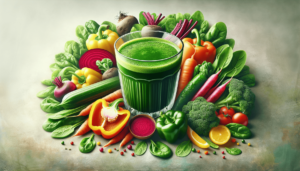Have you ever felt that sluggish, cloudy sensation in your head that makes it hard to focus or remember things? This phenomenon, often referred to as brain fog, can be frustrating and disorienting. Many people are on the lookout for effective ways to enhance their mental clarity and alertness. Could fresh fruit and vegetable juices be the solution you’ve been searching for?
Lets take a closer look at the question: Does Juicing Help Brain Fog?

Understanding Brain Fog
Brain fog isn’t a medical condition; rather, it describes a symptom that affects your mental clarity. You might feel forgetful, have trouble focusing, or experience a sense of confusion. This can happen due to various factors, including poor sleep, stress, nutritional deficiencies, dehydration, or overloaded schedules. If you find yourself grappling with brain fog, it’s crucial to identify its root cause.
The Nutritional Connection
One area where you can make a significant impact on brain fog is through your diet. What you consume affects your brain function in numerous ways. Essential vitamins, minerals, and antioxidants found in fruits and vegetables are critical for maintaining optimal brain health. Juicing can be a convenient way to integrate more of these nutrients into your daily routine.
How Juicing Works
Juicing involves extracting the liquid from fresh fruits and vegetables, leaving behind the pulp. This process makes it easier for your body to absorb a high concentration of vitamins and nutrients. Instead of consuming a large salad or bowl of fruit, a serving of juice can provide a powerhouse of nutrition in a single glass.
The Benefits of Juicing for Brain Health
Juicing offers a wide range of benefits for your brain, which can help alleviate brain fog. Let’s break down some of these benefits:
Increased Nutrient Intake
Juicing can significantly boost your intake of essential vitamins and minerals. For example, juices packed with Vitamin C from oranges, berries, or leafy greens can enhance cognitive function and improve mood. Substantial Vitamin E levels found in nuts and spinach may lower the risk of cognitive decline, making juicing an excellent way to support brain health.
Antioxidant Power
Fruits and vegetables are rich in antioxidants, which can protect your brain from oxidative stress. Ingredients like blueberries, peppers, beets, carrots and spinach contain powerful antioxidants that combat inflammation and may lead to improved memory and cognitive function.
Hydration Boost
Staying hydrated is key for maintaining mental clarity. Juices from water-rich fruits and vegetables can contribute to your daily hydration requirements. When your body is well-hydrated, your brain functions optimally, reducing feelings of fatigue and brain fog.
Energy Levels
Getting a quick energy boost is often a precursor to enhanced mental clarity. The natural sugars from fruits in your juice provide a swift energy release, helping you feel more alert and focused. This is especially true when combined with energy-sustaining ingredients like greens or nuts. But, keep in mind that too much sugar can bring numerous negative effects to the body.
Juicing Ingredients for Brain Health
Now that you understand the overall advantages of juicing, let’s look at some specific fruits and vegetables that can particularly benefit your brain health.
| Ingredient | Key Nutrients | Benefits |
|---|---|---|
| Spinach | Vitamin K, Folate, Iron | Improves memory and cognitive function. |
| Blueberries | Antioxidants, Vitamin C | Protects against cognitive decline. |
| Beets | Nitrates, Folate | Enhances blood flow to the brain. |
| Oranges | Vitamin C, Flavonoids | Supports mental function and mood. |
| Walnuts | Omega-3 Fatty Acids | Boosts brain health and cognitive performance. |
Ideal Juicing Combinations
Mixing various fruits and vegetables can optimize the benefits. Here are some tasty juicing combinations to consider:
Green Detox Juice
- Ingredients: Spinach, kale, cucumber, green apple, and lemon.
- Benefits: Packed with iron and antioxidants, this juice detoxifies while boosting cognitive abilities and overall health.
Berry Brain Booster
- Ingredients: Blueberries, strawberries, raspberry, and a splash of almond milk.
- Benefits: This blend is an antioxidant powerhouse that enhances memory, cognitive function, and mood.
Beetroot Energy Juice
- Ingredients: Beets, carrots, ginger, and orange.
- Benefits: Great for increasing blood flow and energy levels, this juice supports mental performance through improved circulation.
Citrus Power Juice
- Ingredients: Oranges, grapefruit, and a hint of mint.
- Benefits: Rich in Vitamin C, this refreshing juice can help ward off mental fatigue.
The Role of Diet Beyond Juicing
While juicing can play a significant role in reducing brain fog, it’s also essential to maintain a healthy overall diet. Let’s discuss some dietary choices that complement juicing effectively.
Whole Foods
In addition to juicing, focus on whole foods like nuts, seeds, whole grains, and lean proteins. These food types are rich in nutrients that support brain health. Healthy fats, such as those found in avocados and fish, provide essential fatty acids that are vital for optimal cognitive function.
Adequate Hydration
Apart from juice, ensure you’re drinking enough water throughout the day. A hydrated brain is a happy brain, and proper hydration can reduce fatigue and enhance focus.
Balanced Meals
Aim for balanced meals that combine carbohydrates, proteins, and fats. This balance can help maintain steady energy levels and prevent the spikes and crashes that contribute to brain fog.
Lifestyle Changes to Combat Brain Fog
Diet is just one part of the equation. Implementing some lifestyle changes can significantly contribute to your mental clarity and cognitive function.
Regular Exercise
Physical activity increases blood flow to the brain and releases endorphins, improving your mood and focus. Aim for at least 30 minutes of moderate exercise most days of the week.

Quality Sleep
Your brain needs time to rest and recuperate. Prioritize getting 7-9 hours of quality sleep each night to enhance memory consolidation and cognitive performance.
Stress Management
Chronic stress can impair your brain function. Incorporating stress-reducing activities such as yoga, meditation, or simple breathing exercises can help clear mental fog and promote overall clarity.

Common Misconceptions About Juicing
While juicing has its benefits, it’s essential to address some misconceptions that might cloud your judgment.
Misconception #1: Juice is a Meal Replacement
Juice should complement your diet, not replace essential meals. While it provides nutrients, it often lacks the necessary fiber and protein your body needs to function efficiently.
Misconception #2: All Juices Are Good For Me
Not all juices are beneficial. Processed juices or those with added sugars can be detrimental to your health. Always opt for fresh and, if possible, organic fruits and vegetables for optimal benefits.
Misconception #3: Juicing Alone is a Cure
Juicing can be a helpful component in combating brain fog, but it is not the sole solution. It’s essential to adopt a well-rounded approach that includes a balanced diet, exercise, and healthy lifestyle choices for long-lasting effects.
Practical Tips for Juicing
If you’re convinced that juicing might help with your brain fog, here are some practical tips to get started.
Invest in Quality Equipment
A good juicer makes the process easier and ensures you get more nutrition from your produce. Look for a juicer that can handle a variety of fruits and vegetables.
Prep Ahead of Time
Preparing juice can feel cumbersome. Consider pre-cutting and storing your fruits and vegetables to have them on hand for a quick juice.
Experiment with Flavors
Don’t be afraid to mix and match different fruits and vegetables. Find combinations that you enjoy, keeping in mind their brain-boosting properties.
Store Properly
Freshly made juice can be stored for 24-48 hours in the refrigerator. To maintain its nutrients, store it in a glass container away from light and air.
Track Your Progress
Keep a journal of your juicing experience. Note any changes in mental clarity, alertness, or overall well-being. This can motivate you to continue your juicing journey.

Conclusion
Brain fog can be a daunting challenge, but you have the power to improve your mental clarity and focus. Juicing fresh fruits and vegetables is one effective tool to help combat brain fog. The abundance of vitamins, antioxidants, and hydration found in juice can support your brain health and promote better cognitive function.
By combining juicing with a balanced diet, regular exercise, quality sleep, and effective stress management techniques, you’ll be well on your way to a clearer mind and sharper focus. Start experimenting with different juices and make adjustments to your lifestyle, and you might just find the clarity you’ve been seeking. Remember, in your journey towards better brain health, a positive and proactive attitude can make all the difference!


